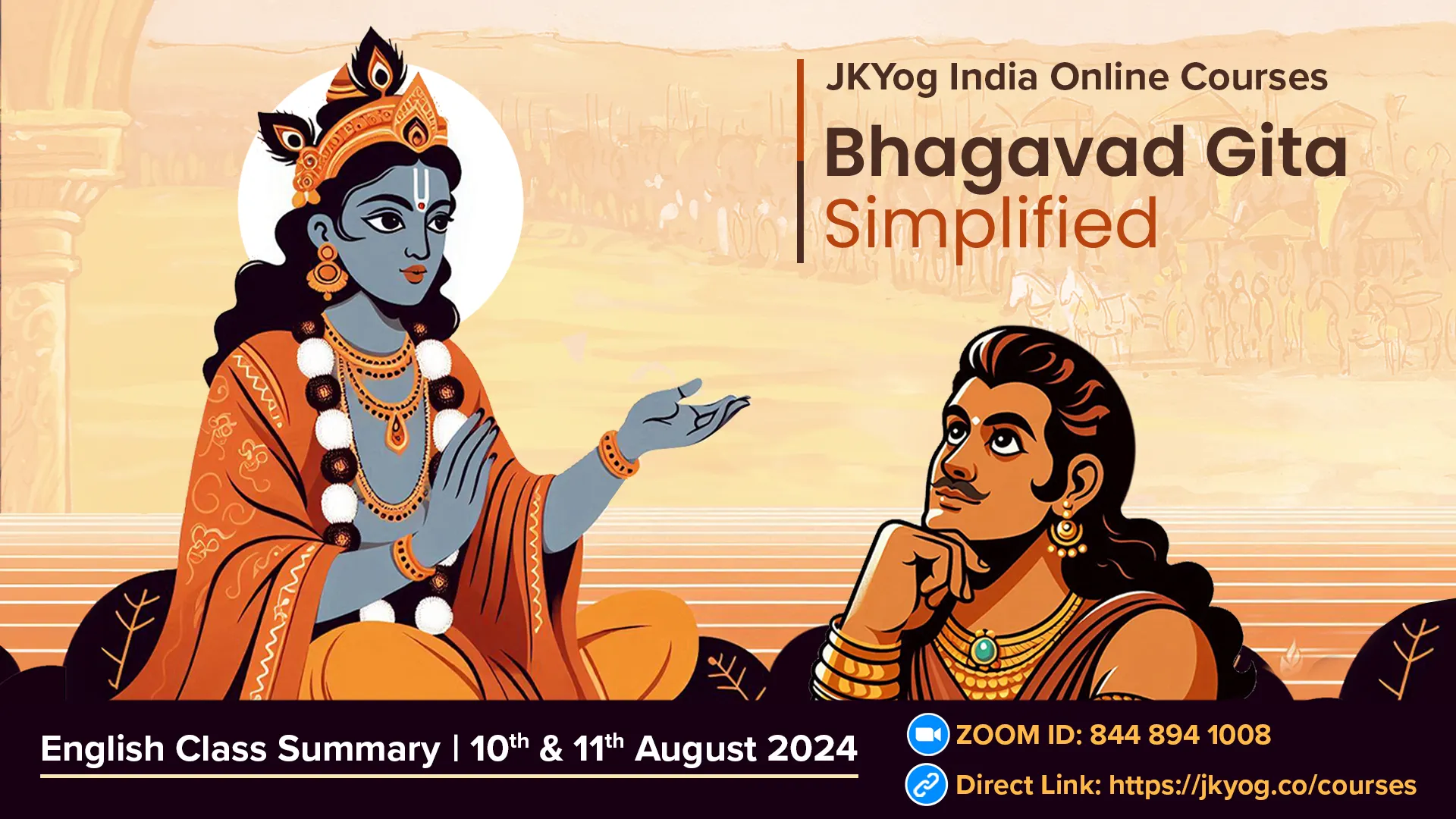The first two classes of the 'Bhagavad Gita Simplified' explored several key aspects of the Bhagavad Gita. The class began with an overview of the Vedas and Vedic scriptures, highlighting their eternal knowledge and foundational role in Hindu philosophy. It then delved into the Bhagavad Gita's unique position as both a Shruti and Smriti text, linking ancient wisdom with contemporary life. The class examined the Gita's relevance in modern times, emphasising its guidance on making thoughtful decisions and integrating spirituality into daily life. It also discussed the historical context of the Gita, setting the scene of the Kurukshetra battlefield and the inner conflicts of key characters such as Dhritarashtra, Duryodhan, and Arjun.
The Role of Vedas and Vedic Scriptures
To truly appreciate the Bhagavad Gita, one must understand its origins in the Vedic tradition. The Vedas are considered eternal knowledge given by God and form the foundation of Hindu philosophy. Initially, these teachings were given to Brahma, the creator, and have been passed down through generations as Shruti (śruti/ श्रुति), or "heard knowledge."
The Vedic scriptures are organised into a group called Prasthanatrayi (Prasthānatrayī/ प्रस्थानत्रयी), which includes the Upanishads, the Bhagavad Gita, and the Brahma Sutras. Together, these texts provide guidance for spiritual and philosophical exploration. The Bhagavad Gita uniquely serves as both a shruti and smriti (smṛti/ स्मृति) text, creating a connection between ancient wisdom and modern life.
The Importance of the Bhagavad Gita
The Bhagavad Gita holds a unique place in the canon of spiritual literature. It is described as both Brahma Vidya—the science of God-realisation—and Yog Shastra—the practice of Yog. Brahma Vidya offers a comprehensive understanding of the Absolute Truth, providing insight into the ultimate secrets of the universe. In contrast, Yog Shastra emphasises the integration of spiritual knowledge into daily life, teaching the paths of Karma Yog (selfless action), Jnana Yog (knowledge), and Bhakti Yog (devotion).
The Bhagavad Gita excels in blending philosophical wisdom with practical application, making its teachings accessible and relevant to our daily lives. It guides us toward a holistic understanding of reality, where every action can be imbued with spiritual significance, no matter how mundane.
The Relevance of the Bhagavad Gita in Modern Life
In an era dominated by quick fixes and short-term solutions, the Bhagavad Gita offers a refreshing perspective on the importance of long-term spiritual practices. It provides timeless wisdom that helps us make thoughtful decisions, understand our true identity, and lead a life of purpose and fulfilment.
Whether it's discovering your life's purpose, handling life's challenges, or balancing the demands of work and spirituality, the Gita's teachings apply to all aspects of life. The Gita encourages us to integrate spirituality into our daily routine, from making ethical choices to growing personally and spiritually.
The Historical Context of the Bhagavad Gita
The Bhagavad Gita was spoken on the brink of the Mahabharata, a monumental war between the Kauravas and Pandavas. This conflict, steeped in familial ties and moral dilemmas, set the stage for the Gita's teachings. Delivered by Krishna to Arjun, who was torn by doubt and confusion, Gita's message transcends the immediate context of the war, offering universal truths that continue to guide humanity.
The Gita's historical backdrop, with its rich narrative and profound lessons, highlights the enduring relevance of its teachings. It reminds us that the challenges we face today, though different in form, are not unlike those faced by Arjun. The Gita equips us with the wisdom to navigate our own battles with clarity, determination, and spiritual insight.
Understanding the Scene and Characters in the Bhagavad Gita
In the Bhagavad Gita, the scene is set on the battlefield of Kurukshetra, where two mighty armies stand ready for a war that seems inevitable. The blind King Dhritarashtra, clouded by his attachment to his sons, asks Sanjay to describe the events unfolding on the battlefield. His inquiry stems from a deep sense of guilt and fear, knowing the battle is unjust, yet driven by his biased affection towards his sons, the Kauravas.
Dhritarashtra's Inner Conflict
Dhritarashtra's fondness for his sons blinds him to spiritual wisdom, leading him to usurp the kingdom of Hastinapur from the rightful heirs, the Pandavas. His conscience is burdened with guilt for the injustice towards his nephews, and he anxiously questions the outcome of the impending war. Despite the sacred setting of Kurukshetra, which might inspire a sense of righteousness, Dhritarashtra remains fearful of losing his sons.
Duryodhan's Ego and Overconfidence
Duryodhan, the eldest of the Kauravas, embodies arrogance and a deep-seated hatred for the Pandavas. Despite knowing the battle is unfair, he is driven by a desire for power, dismissing the virtues taught by his teacher, Dronacharya. His overconfidence and delusional belief in his invincibility lead him to underestimate the strength and resolve of the Pandavas. This attitude reflects his insecurities and fear of losing his position.
Arjun's Inner Turmoil
As Arjun prepares to fight, he asks Krishna to place his chariot between the two armies, seeking a closer look at those he must fight. Overwhelmed with emotion upon seeing his relatives on both sides, Arjun experiences a profound inner conflict. The thought of fighting and possibly killing his own relatives leaves him paralysed with stress, causing his body to tremble and his mind to whirl in confusion.
Moral Dilemma and Loss of Desire
Arjun questions the very purpose of the war, expressing a lack of desire for victory or power, knowing it comes at the cost of his family's lives. He fears the battle's sinful consequences, which could lead to the destruction of family traditions and societal values. In despair, Arjun declares that it would be better to be killed unarmed and unresisting than to engage in such a sinful act.
This marks the beginning of Arjun's journey from confusion and despair to the eventual clarity and wisdom that Krishna imparts in the subsequent chapters of the Bhagavad Gita.
Summary: JKYog India Online Class- Bhagavad Gita Simplified [English]- 10th and 11th August 2024








